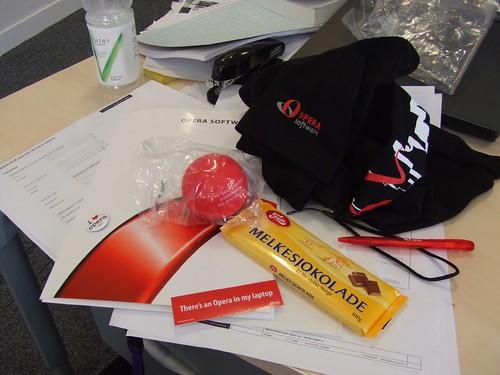With the copious amount of free alcohol still in my body and this being somewhat of a celebration (the 350th post – yes, it is rather random, sue me), let me allow myself to talk of a night out in the West End (10 minutes from the office) with Opera playing host to bloggers and web developers showing off their new products and ideas.
Opera invited me to the backstage thing via onlinetools.org (of all places) and asked me to bring workmates along as they are interested in sharing their ideas and show what they are doing.
The crowd was the typical London mix and some unexpected faces: Yahoo peeps, BBC peeps, Clearleft from Brighton (Andy Budd, Richard Rutter, Jeremy Keith with his lovely wife), local bloggers and web developers and some less obvious people like Ian Lloyd and James Edwards.
Opera provided the good ingredients of any Webdev meeting:

- Schwag in form of free T-Shirts, squishy balls, badges (stating “I love Opera” and thereby being great to sell in Covent Garden at the end of a performance if you are ever really skint) and more things I cannot remember right now as I left the bag in the office when I picked up my laptop.
- Drinks and fingerfood of the free variety. Originally every visitor had 2 drink vouchers, but the later the evening got the more of those free papers appeared miraculously (I just found two in my pocket).
The presentations had all good information, but you could see that Opera build browsers and don’t sell other products for a living. A highlight was Jeremy Keith talking about the web and HTML as a brilliant idea without his presentation or notes as his laptop died on him right at the wrong moment. His talk was a proof that if you take the instructions away from an Irishman, he’ll turn into an instant poet. It was a joy to see.
Technically there were some interesting bits to see:
- As hinted on barcamp, Opera is working on a 3D SVG engine inside the browser, which would allow for OpenGL style apps. The 3D “Snake” adaptation they showed was a bit on the flickery and slow side, but that may be due to the presentation machine or the lack of buffering in the code.
- Opera finally has some very impressive debugging tools that allow you to see the code as it is rendered, change the DOM, show the dimensions of an object and even use a picker to choose a colour from the page to re-use in CSS. Finally we’ll be able to fix the odd rendering bugs Opera shows from time to time easily and without guesswork.
- One really impressive bit was to see a “labs” version of Opera that did not only do the dynamic resizing of the whole document to browser window size, but also allows you to zoom in on certain elements, effectively turning the browser into a screen magnifier.
More talks were about the History of Opera, how good it is on mobile phones, what might be in store for the mobile web and that widgets are a revolutionary great idea. Opera has been pushing their widgets into interesting environments (the Assembly demoscene event in Finland being one), but personally I used them to play some games but I fail to see the point. I don’t use the OSX Dashboard widgets, the Firefox, the Google or the Yahoo ones either. I don’t know the numbers of how many people use them but I get the impression that this novelty can wear off quickly.
In the following Q&A session I got to finally get an answer why Opera for years pretended to be MSIE - reason being that “servers” like IIS4 would not give them any HTML results if they hadn’t some recognizable ident in the navigator string (Mozilla or Explorer).
All in all I’d say it was a good meeting and made me aware of some of the things Opera is doing that I didn’t know about. It also showed me that they mean it when they say they want to support web standards and it gave me some good contacts to whinge at when some of my stuff will not work in Opera.
